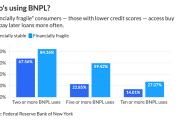
The company's goal is to use gen AI to "prework" a lot of
He cautioned that it's very early to predict the long-term effects of gen AI, but he's optimistic about ways to deploy the technology across the organization.
"No one has lost their job to be replaced by a robot at Affirm … but in terms of our ability to scale our customer service and base as we employ AI more and more, that's certainly going to be a cost saving over the next one to three years," Levchin said.
Affirm's biggest challenge this year is refining features of its much-ballyhooed
"It takes a long time to invent a new type of card," Levchin said, noting that Affirm made headway during the recent quarter in helping Affirm Card users understand the best use cases for paying with the Visa card's debit mode versus financing a preplanned purchase with interest at the point of sale or deciding to split a purchase into four equal payments over six weeks, with no interest.
"During the last quarter we launched a lot of tweaks and fixes, making the card more comprehensible and easier to use and understand," Levchin said.
For example, using the pay-later mode in a restaurant poses some challenges when customers have to factor in a tip, Levchin said.
About 10% of Affirm Card users' spending on the card is now in the debit mode, up from 6% during the quarter that ended Dec. 31, 2023.
Increasingly, customers are using Affirm for more diverse purchases, including for everyday items, Levchin said.
During the recent quarter, general merchandise accounted for 32% of Affirm purchases, with fashion/beauty and travel/ticketing each accounting for about 16% of purchases and sporting goods coming in at 4%. By contrast, Peloton bikes accounted for about 30% of Affirm's sales in 2021.
Affirm's total transactions during the quarter rose 50%, to 21.5 million from 14.4 million a year earlier. More than three-quarters, or 77%, of Affirm's transactions occurred at the point of sale, with 23% initiated online, through the mobile app or with the Affirm Card. Seventy-two percent of Affirm's loans were interest-bearing during the quarter.
The company's gross merchandise volume rose 36% during the company's third fiscal quarter, to $6.3 billion from $4.6 billion during the same period a year earlier, while total revenue soared 51%, to $576 million compared with $381 million during the year-earlier period.
Delinquencies on monthly installment loans stayed flat and Affirm's net loss shrank to $134 million compared with a loss of $206 million during the same period a year earlier.
Despite generally positive trends, Affirm's stock sank to $31 a share from $35 a share pre-earnings, and it ended the week at $32 a share, as investors were underwhelmed by Affirm's slower-than-expected momentum.
"We view Affirm as substantially overvalued, particularly given that the company's pace of growth will likely be too slow to capture the fastest income-growth segments of Gen Z," said equity analysts at Morgan Stanley in a Thursday note to investors. "We increasingly believe that Affirm's long-term customer base will be made up primarily of lower-income consumers more evenly distributed across age demographics, which likely implies economic life cycle income and spending potential growth will be limited," they wrote.






